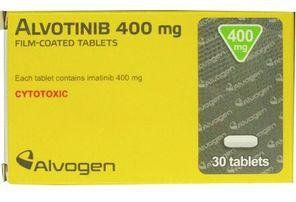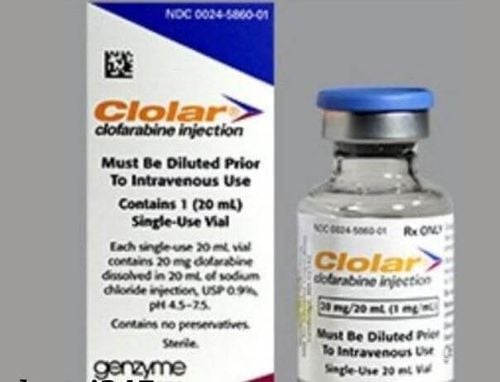This is an automatically translated article.
Umkanib medicine is made in the form of tablets, with the main ingredient being Imatinib. The drug is used in the treatment of chronic lymphocytic leukemia and myeloid leukemia.
1. Uses of the drug Umkanib
1 Umkanib 100 tablet contains 100mg of Imatinib (as Imatinib mesylat). Imatinib is a protein-tyrosine kinase inhibitor that specifically inhibits Bcr-Abl Tyrosine kinase (the abnormal molecule that causes chronic myeloid leukemia) by preventing Bcr-Abl from binding to A.T.P. It acts precisely on the pathogenic molecule with a very high hematological and cytogenetic response rate, enabling patients to return to a normal life. Imatinib is used orally.
Indications for use of Umkanib
Adults and children with newly diagnosed Philadelphia chromosome positive chronic myeloid leukemia when bone marrow transplantation is not first-line therapy; Adults and children with chronic myeloid leukemia in a blast, acute or chronic phase after failure of interferon-alpha therapy or during a flare; Adults and children with Philadelphia chromosome positive acute lymphoblastic leukemia, receiving chemotherapy; Adults with recurrent acute lymphoblastic leukemia or patients unresponsive to monotherapy; Adults with myeloproliferative or myeloproliferative diseases associated with gene rearrangements of platelet-derived growth factor receptors; Adults with advanced systemic mast cell disease without a D816V c kit mutation or with unknown c kit mutation status; Adults with progressive eosinophilia, chronic eosinophilic leukemia with FIP1L1-PDGFR α rearrangement; Adults with malignant, unresectable or metastatic gastrointestinal stromal tumors; Adults with unresectable, recurrent, or metastatic fibrosarcoma. Indications to use Umkanib:
Patients with hypersensitivity to Imatinib or other ingredients of the drug.
2. Usage and dosage of Umkanib
How to use: Umkanib should only be used orally under the supervision of physicians with clinical experience in the treatment of hematologic malignancies or malignant neoplasms. Patients should take the drug with meals with a full glass of water about 240ml to reduce the risk of stomach irritation.
Dosage:
Children over 2 years old: Take the drug once or in 2 divided doses/day:
Chronic myeloid leukemia Ph+ (chronic stage, persistent or recurrent): Use dose 260mg/m2/ day; Ph+ chronic myeloid leukemia (chronic stage, newly diagnosed type): Use dose 340mg/m2/day, maximum use 600mg/day. Adults:
The usual dose is 400 - 800mg/day. Should be taken 1 time / day if the dose is 400 - 600mg / day, should be divided into 2 times if the dose is 800mg / day; Ph+ chronic myeloid leukemia: 400mg/day. The dose may be increased to 600 mg/day if response is poor after 3 months of treatment; With acute phase or too many immature cells in the blood: Use 600mg/day. Dosage may be increased up to 800 mg/day if response is poor; Acute lymphocytic leukemia Ph+ relapse or failure of other treatments: 600mg/day; Tumors connecting the stomach - intestines: If treated after surgery to remove the tumor, use a dose of 400mg/day. In case the patient cannot have surgery or has malignant metastases, the dose of 400mg/day can be increased to 800mg/day; Systemic invasive mast cell disease: The initial dose is 100mg/day, the dose can be increased to 400mg/day; Imatinib is used as a second-line drug to treat chronic myeloid leukemia: 400-600mg/day. Adjust the dose of Umkanib in the following cases:
Avoid using imatinib in combination with strong CYP3A4 inducers (eg, phenobarbital, dexamethasone, carbamazepine, phenytoin, rifampicin). If a combination is required, the dose of Imatinib must be increased to at least 50% and the patient's health should be carefully monitored; Patients with renal failure: Mild renal failure (Cl 40 - 59ml/min): The maximum dose is 600mg/day; Moderate renal failure (Cl 30 - 39ml/min): The maximum dose is 400mg/day; Severe renal failure (Cl less than 20ml/min): Care should be taken when using Umkanib, the tolerable dose is 100mg/day; Patients with hepatic impairment : For patients with mild and moderate hepatic impairment , it is not necessary to reduce the dose of Umkanib . In patients with severe hepatic impairment, the dose should be reduced by 25%; Patients with toxic liver damage during drug use: Discontinue use if bilirubin = 3 times upper limit or transaminase > 5 times upper limit. In case bilirubin < 1.5 times upper limit and transaminase < 2.5 times upper limit, imatinib can be re-administered at the following dose: Children over 2 years: If current dose is 260 mg/m2/day, reduce 200mg/m2/day. If the current dose is 340mg/m2/day, reduce it to 260mg/m2/day; Adults: If current dose is 400mg/day, reduce to 300mg/day. If current dose is 600mg/day then reduce to 400mg/day. If current dose is 800mg/day then reduce to 600mg/day. The duration of treatment until the disease is stable can last from 7 days to 13 months (usually 7 months).
Missed dose: If a dose of Umkanib is forgotten, the patient should take that dose as soon as he remembers. If it is almost time for the next dose, the patient should skip the missed dose and just take the next dose as originally planned.
Overdose: If Umkanib overdose, the patient should immediately notify the doctor or go to the nearest hospital for timely treatment.
3. Side effects of the drug Umkanib
When using Umkanib, patients may experience some side effects such as:
Very common: Cardiovascular: Edema/fluid retention including peripheral edema, pleural effusion, ascites, pulmonary edema, edema face; Central nervous system: Fever, headache, fatigue, restlessness, depression, insomnia, chills; Skin: Rash, rash, hair loss; Endocrine and metabolic: Hypokalemia; Hematology: Bleeding, gastrointestinal bleeding, intracranial hemorrhage, thrombocytopenia, anemia, leukopenia, neutropenia; Gastrointestinal: Nausea, vomiting, abdominal pain, loss of appetite, diarrhea, dyspepsia, constipation, weight gain; Liver: Increased ALT or AST, toxic hepatitis, increased bilirubin; Muscles and Bones: Muscle pain, weakness, arthralgia, cramps, musculoskeletal pain, bone pain; Eyes: Blurred vision, conjunctivitis, conjunctival bleeding, eyelid edema, dry eyes; Renal: Increased plasma creatinine; Respiratory: Shortness of breath, cough, nasopharyngitis, rhinitis, pharyngitis, oropharyngeal pain, upper respiratory tract infection, pneumonia, sinusitis; Other symptoms: Flu, night sweats, infections without leukopenia; Very common: Cardiovascular: Hot flashes; Central Nervous System: Bleeding into the brain or meninges; Endocrine and metabolic: Decreased albumin, decreased blood calcium, increased blood glucose; Skin: Redness, dryness, increased sensitivity to light; Gastrointestinal: Mucositis, flatulence, weight loss, abdominal pain, gastritis, gastrointestinal bleeding, mouth ulcers, gastroesophageal reflux, taste disturbances; Hematology: Fever, neutropenia, lymphocytopenia; Liver: Increased alkaline phosphatase, increased AST, increased bilirubin; Muscles and bones: Pain in the extremities, back pain, muscle weakness, peripheral neuropathy - osteoarthritis; Eyes: Dry eyes, blurred vision, eyelid edema; Uncommon: Acute neutropenic dermatitis, increased amylase, anaphylaxis, angioedema, chest pain, hemolytic anemia, severe heart failure, cardiogenic shock, arrhythmia (in some cases atrial tachycardia) , hyperkalemia, hyperuricemia, hypercalcemia, hyponatremia, hypomagnesaemia, hypophosphataemia, toxic skin necrosis syndrome, Stevens - Johnson syndrome, chromosomal fixed erythema, Raynaud's syndrome , urticaria, respiratory failure, renal failure, tumor necrosis, tumor bleeding, increased intracranial pressure, cerebral edema, urinary infection. When experiencing side effects of Umkanib, patients should promptly notify their doctor for the most appropriate intervention.
4. Precautions when taking Umkanib
Some notes patients need to remember before and while using Umkanib:
In the case of having to use Umkanib in pregnant women, it is necessary to warn in advance about the risk of toxicity to the fetus; To date, there is no information on the safety and efficacy of imatinib in children younger than 2 years of age. Vomiting, nausea and myalgia were the most common side effects in children receiving imatinib; Because Imatinib is metabolised by the liver, patients with liver failure who take imatinib should be carefully monitored for liver function indicators such as alkaline phosphatase, bilirubin and transaminase; Elderly patients with a history of heart disease are at increased risk of developing severe heart failure or left ventricular dysfunction while taking imatinib. Therefore, careful evaluation, monitoring, and treatment of any presenting with heart failure should be considered; Patients taking Imatinib may have reduced toxicity of blood cell lines, so it is necessary to monitor blood cell counts weekly during the first month of treatment and February. every 2-3 months in the following months; Umkanib should not be used in pregnant and lactating women. Women of childbearing age should use contraception while using this medicine; Use caution when using Umkanib when driving and operating machinery.
5. Umkanib drug interactions
Some drug interactions of Umkanib include:
Avoid concomitant use of Imatinib with the following drugs: Alfuzosin, BCG, fluticasone, halofantrin, lapatinib, nisoldipine, lovastatin, lurasidone, natalizumab, nilotinib, salmeterol, silodosin, simvastatin, tacrolimus, tamsulosin, thioridazine, eplerenon, everolimus, pimecrolimus, pimozide, ranolazine, rivaroxaban, romidepsin, clozapine, conivaptan, crizotinib, dronedarone, ticagrelor, tolvaptan, forernifen, live vaccine; Imatinib inhibits CYP3A4, CYP2C9, increasing the anticoagulant effect of warfarin. Therefore, if anticoagulation is required, the patient should use heparin; Drugs that affect the liver microsomal erizome such as CYP3A4 inhibitors (erythromycin, itraconazole, clarithromycin, ketoconazole) may increase the serum concentration of imatinib; CYP3A4 inducers (carbamazepine, phenobarbital, phenytoin, dexamethasone, rifampicin) may decrease imatinib serum concentrations. Therefore, if these drugs are used concomitantly, it may be necessary to increase the dose of imatinib by at least 50% and to closely monitor the clinical response; Acetaminophen may be increased concentration or effect when used in combination with imatinib; Imatinib may decrease the levels or effects of BCG, cardiac glycosides, Coccidioidin skin test, codeine, fludarabine, sipuleucel-T, ticagrelor, prasugrel, tramadol, vitamin K antagonists, vaccines (live/inactivated); Drugs that may decrease the concentration or effect of Imatinib include: Cyproterone, deferasirox, peginterferon alfa-2b, echinacea, rifamycin derivatives, tocilizumab; Do not drink alcohol while using Imatinib; Grapefruit juice may increase imatinib levels. When taking Umkanib, patients should pay attention to follow the above tips to ensure the best therapeutic effect and avoid dangerous side effects.
Follow Vinmec International General Hospital website to get more health, nutrition and beauty information to protect the health of yourself and your loved ones in your family.
Please dial HOTLINE for more information or register for an appointment HERE. Download MyVinmec app to make appointments faster and to manage your bookings easily.













